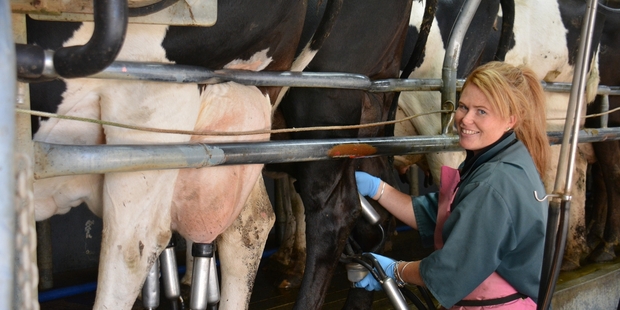Women prove top dairy farm bosses - May 2016

MILKING TIME: Dairy manager Renae Flett at work in the shed.
She may have left Whanganui High School with no qualifications, but Renae Flett was judged Manawatu's top dairy manager this year.
She has a passion to prove women can be just as good as men in the industry. In Manawatu, women were four of the five finalists in the annual dairy manager competition.
But it's not the same everywhere. At the national finals earlier this month, Miss Flett was the only woman representing any of the 11 regions.
"Hopefully we are just starting to push our way through," she said.
The regional finals had two rounds of judging at the farm where she works, with two judges at each round. The nationals had three rounds of judging, also at the farm, with two and three judges at each round.
For the competition, she put together a 90-minute presentation on her farming system - pasture, day-to-day running, animal health and her own contributions. She made a 70-page book, and information and photo boards to go with the presentation. It was a lot of work and the national winner was a man from Waikato, Thomas Chatfield.
Miss Flett has spent 12 years in the dairy industry. She's been managing Peter and Kim Bills' Te Rata Farms property near Linton for the last two years. It's 100ha of rolling to flat country, with a herd of 250 mainly Friesian cows.
It's been a tough year, with the low payout of $3.90 per kilo of milk solids. But the farm is also a low input one, with the herd fed mainly on grass in various forms.
Costs are kept down by Miss Flett and the owners doing all their own cultivation, hay and balage, and growing whole crop barley. They use their own tractors and machinery and only feed a little palm kernel expeller (PKE) in the milking shed.
Under that low-input system, a kilo of milk solids costs just $2.80 to produce. But money is still tight, with mortgages to pay.
"It's not been an easy season, but it will improve. It always does."
Miss Flett mainly works 12-hour days, with up to 16 hours a day during calving. She gets every second weekend off.
She said her salary was low compared to some, but having supportive employers made up for it.
"They let me try everything I want to do, and they've supported me 100 per cent through the industry awards."
Growing up in Whanganui she liked horse riding and got interested in dairy farming through helping a friend who was milking.
"I decided I like cows. They're a lot like horses."
She got her first dairy job at a farm near Palmerston North, aged 18.
Since then she has studied agribusiness through the Primary Industry Training Organisation up to Level 5.
Next year she plans to start a Diploma in Dairy Management.
But there's another change coming for her before that.
On June 1 she starts a new job as contract milker on a Rongotea farm with a herd of 180. She'll be her own boss for the first time, and may employ relief milkers. It's an exciting change that she's looking forward to.
Ultimately she'd like to progress to sharemilking and then owning her own dairy farm, preferably another low input one and preferably in the Manawatu where she has worked for so long.
"I love it around here, and I've got lots of friends and family here now," she said.
